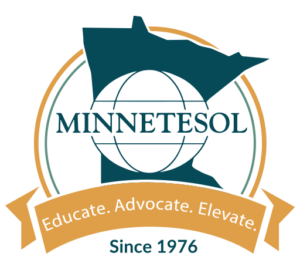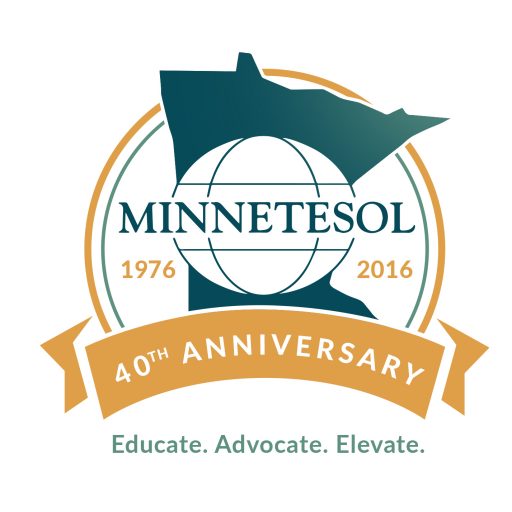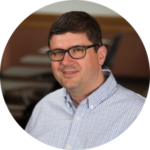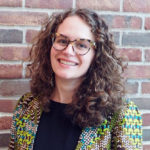The 2020 Advocacy Report from Washington
The 2020 TESOL Advocacy & Policy Summit, usually held in Washington, D.C., was held virtually this year on June 22-24, 2020. This format allowed fourteen MinneTESOL members from all over the state to attend!
What do MinneTESOL attendees have to say about the TESOL Advocacy & Policy Summit?
“The summit reinforced the importance of entering into those “courageous conversations” that are integral to effective advocacy, especially at these challenging times of uncertainty.” -Sandra Juni, ELL Coordinator, Hmong College Prep Academy
“I often cringe at the question, ‘Where were you born?’ on school registration paperwork. This question can make families feel unsafe. Now I know that even though schools are required to provide this kind of information, they are also allowed to use an estimate, making the question unnecessary.” -Rebecca Hildreth, EL Teacher, Mounds View Public Schools
“With everything going on in the world and in society, now is the time to advocate for the needs of our culturally and linguistically diverse students and their families because there are people who are willing to listen to us right now.” -Erica Solorio, EL Teacher, Rosemount-Apple Valley-Eagan Public Schools
“I learned about how funding is allocated to school districts. I was amazed at how many educators are so committed to equity for ELs.” -Sara Maldonado, EL Teacher, West St. Paul-Mendota Heights-Eagan Area Schools
“It was inspiring to be with 200+ educators from around the country and the world who care about English learners.” -Laura Lenz, EL Teacher, Rochester Public Schools
“Attending the TESOL Summit grew my knowledge base about our field so much. I appreciated learning about the legal rights of students and families and about legislative priorities that can enhance how we serve them.” – Rachael Bird, EL Teacher, Owatonna Public Schools
“The TESOL Advocacy & Policy Summit reinforced for me how many different lanes of advocacy there are. It does not look just one way or require everyone who wants to speak up for their students to head directly to the Capitol. Also, there is always an immediate need for educators to advocate.” -Leah Soderlund, EL Teacher/MinneTESOL External Relations Director
“I appreciated hearing from international panelists about their advocacy work during the ‘What’s Happening Globally?’ session, an update from the Office of English Language Acquisition, and the reflective opportunity to plan for how I will advocate for English learners and their families.” -Sam DiVita, PAR Educator/ESL Educator, St. Paul Public Schools
Highlights of TESOL’s current legislative priorities include:
- Increased funding for K-12 English learners (ELs) through Title III of the Every Student Succeeds Act.
- Increased funding for adult ELs through Title II of the Workforce Innovation and Opportunity Act
- $1 billion in supplemental aid for K-12 ELs in any future COVID-19 relief funding package passed by Congress.
- Passage of the American Dream and Promise Act by the United States Senate, which would ensure a path to permanent citizenship for Dreamers.
- Passage of the Reaching English Learners Act, which would provide additional funding for the training of future TESOL educators at the K-12 level.
More information here: TESOL’s Policy Recommendations for the 116th U.S. Congress
Wondering how to get involved? Advocate from home using the TESOL Action Center!
TESOL has created an Action Center with links for you to connect with your local legislators. You can raise awareness around the issues impacting English language learners and their families. Once you enter your name and address, your specific legislators will populate. Messages can be personalized, as well. It’s easy and you don’t have to be a member of TESOL to utilize the resources. Follow this link.
Connect with us!
- Email [email protected] to join our mailing list!
- Find us on Twitter: @MNELAdvocacy
- Find us on Facebook: MinneTESOL Advocacy Facebook
The 2019 Advocacy Report from Washington
I was honored to be one of the representatives of MinneTESOL at the TESOL Advocacy and Policy Summit in Washington, DC June 17-19, and here is a summary for you. First, some information by the numbers….

- TESOL is a community of over 10,000 English language teaching professionals in the U.S. and 150 countries.
- 100 educators and advocates attended the Summit, representing 33 states plus Puerto Rico and the District of Columbia.
- 3 Minnesota representatives were in attendance: Laura Lenz, MinneTESOL president, Sam Ouk, MinneTESOL past president, and Sara Maldonado, MinneTESOL member, Moreland Arts and Health Sciences Magnet School
- The Summit took place over 3 days. 2 days of sessions included federal legislative updates, a presentation on the legal rights of immigrant students in public schools, updates from the Office of English Language Acquisition, information on Adult Basic Education issues, and sessions on the impact of the Every Student Succeeds Act (ESSA) on English learners. The Summit culminated in 1 day of meetings with our U.S. representatives and senators on Capitol Hill advocating for English learners.
- Our MinneTESOL team had 6 meetings with the legislative staff of Minnesota Representatives, including Congresswomen Angie Craig, Betty McCollum and Ilhan Omar as well as Congressmen Jim Hagedorn, Dean Phillips, and Pete Stauber.
- We also had 2 meetings with the legislative staff of Minnesota Senators Tina Smith and Amy Klobuchar.
- We were advocating for the 5,000,0000 English learners in public schools nationwide; the 73,000 pre-K-12th grade English learners in Minnesota; the 29,000 English learners in MN Adult Basic Education programs; plus many English language learners in Minnesota college and university programs.

These are some of the main policy recommendations of TESOL to the 116th Congress this year that we discussed with legislators in our meetings.
- Pass the Reaching English Learners Act (H.R. 1153 and S.345)
This bill has bipartisan support and would address the country’s shortage of trained English learner teachers. Thirty-two states report shortages of teachers with specialized training in teaching ELs. This higher education bill would provide grants for training future teachers to address this critical need. - Fully fund Title III of the Every Student Succeeds Act (ESSA) at the level of $885 million. Title III provides funding for the teaching of English learners and this amount has not increased since 2015 while both inflation and the EL population have increased.
- Fully fund Title II of the Workforce Innovation and Opportunity Act (WIOA) at $678 million. These funds are dedicated for adult and family literacy programs.
- Pass the American Dream and Promise act of 2019 (H.R. 6) and the associated Dream Act of 2019 (S. 874). These acts provide a pathway to citizenship for Deferred Action on Childhood Arrivals (DACA) recipients. There are 800,000 DACA recipients in the U.S. and 5,670 in Minnesota. The House has passed the bill and the associated bill awaits action in the Senate.
I encourage you to advocate for English learners and contact your representatives and senators and educate them about these important issues.
You can find your U.S. representative and information on how to contact them here.
Taking Advocacy to the National Level
On June 18 – 20, 2018 Rachel Casey, our Southwest Regional Liaison, and I, Sam Ouk, MinneTESOL President, participated in the TESOL Advocacy and Policy Summit. Different TESOL affiliates made up of 91 people from 33 different states plus the District of Columbia and Puerto Rico came together to advocate for English Learner adults and children by educating senators and representatives about the needs of our students and how good and bad policies can affect them. The program featured two full days of issue briefings and activities around education activities relating to the profession of ESL and advocacy. The third day consists of our team of advocates heading to Capitol Hill to meet with our Senators and Representatives. This year, the timeline of the TESOL Advocacy and Policy Summit coincided with the debate around separating children from families at the Southern border. Therefore, on top of advocating for full funding of federal dollars towards ESL and pushing policies that promote language learning for our students, this year also had a strong emphasis on advocating for our immigrant students and families and combating the negative agendas that hurt them.
TESOL International, as an organization was phenomenal in putting together sessions to educate their affiliates on a wide range of policies and legislation affecting English Learners in a short amount of time. During the first two days of the session we were informed about the funding discussions around Title I, II and III, the Reaching English Learners Act, authored by Rep. Langevin of Rhode Island, updates around the DACA debate, and the federal discussions around adult English Learners and Pre-K through 12 education which included the possible restructuring of the Office of English Language Acquisition (OELA) which brought many concerns to TESOL and its affiliates.
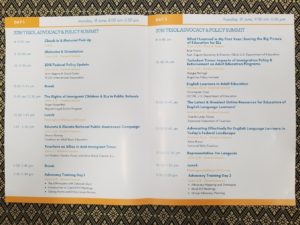
TESOL leaders briefed us that there have been talks to eliminate the position of Director of OELA and move the office under the bigger Office of Elementary and Secondary Education (OESE). TESOL International along with 17 other organizations representing teachers and administrators expressed great concerns around the idea to restructure OELA under OESE. In a letter to Betsy Devos, they outlined two reasons why the move would negatively impact the field of English Language Acquisition.
1) Restructuring would diminish the time and attention needed for English Learners.
2) Restructuring may lower the importance placed on English Learners in the eyes of local education districts.
Christopher Powers, the Executive Director of TESOL also expressed these concerns along with offering the recommendation on behalf of TESOL for Secretary Devos to maintain the current OELA profile to include a full-time director along with a deputy director reporting directly to the secretary and relocate Title III back under OELA as a recent shift moved the management of Title III funding to OESE.
It is not an understatement to say that there are many difficult issues to work through in our field as it relates to the politics of our nation. However, one bright spot is the proposed legislation put forth by Representative Langevin of Rhode Island. His bill, The Reaching English Learners Act will help institutions of higher education across the state prepare the next generation of ESL teachers by providing grants for colleges and universities to train and develop future EL teachers. This will help address the shortage of EL teachers across our state and the nation.
With the information provided by MinneTESOL and the research that Rachel and I did about the specific needs of Minnesota’s English Learner population, we headed to Capitol Hill on our third day to speak to the legislative staff in the offices of Senator Smith and Klobuchar and the legislative staff of Representative Emmer, Lewis and Walz. We asked the legislatures to support the full funding of Title I at the amount of $15.8 billion, Title II at $2.3 billion including $664.5 million for The Workforce Innovation and Opportunity Act (WIOA) and $785 million for Title III. We asked them to support Rep. Langevin’s bill, Reaching English Learners Act (H.R.4838) and ensure that the Office of English Language Acquisition does not get moved under the Office of Elementary and Secondary Education. Furthermore, we expressed deep concerns of what was happening to our immigrant and refugee children and highlighted all the benefits that our students and their families have contributed to our communities.
We invited all Senators and Representatives to join us at our 2018 MELED conference. Rachel and I created a one page summary describing our professional work and the passion we have for our students to include with TESOL Materials for each Congressmen. We encourage all the congressmen to reach out to us and continue the dialogue with MinneTESOL around the needs of our English Learners.
At the end of the Summit, Rachel and I came away with a renewed sense of urgency to speak out on behalf our students. Never in my life, filled with battles on behalf of immigrants and English Learners, do I feel such a dire need to advocate. There are pockets of bright spots such as continued funding of Title I, II, and III and the Bill put out by Representative Langevin. However, many proposals being discussed by the current administration could and have already hurt many of our EL students and their families, along with the profession of English as a Second Language. I will plan to attend the summit again next year and I would encourage more MinneTESOL members to attend. Furthermore, I would encourage our members to continue to find ways to advocate and educate our colleagues around the needs of our students.
Thank you MinneTESOL for this opportunity!
